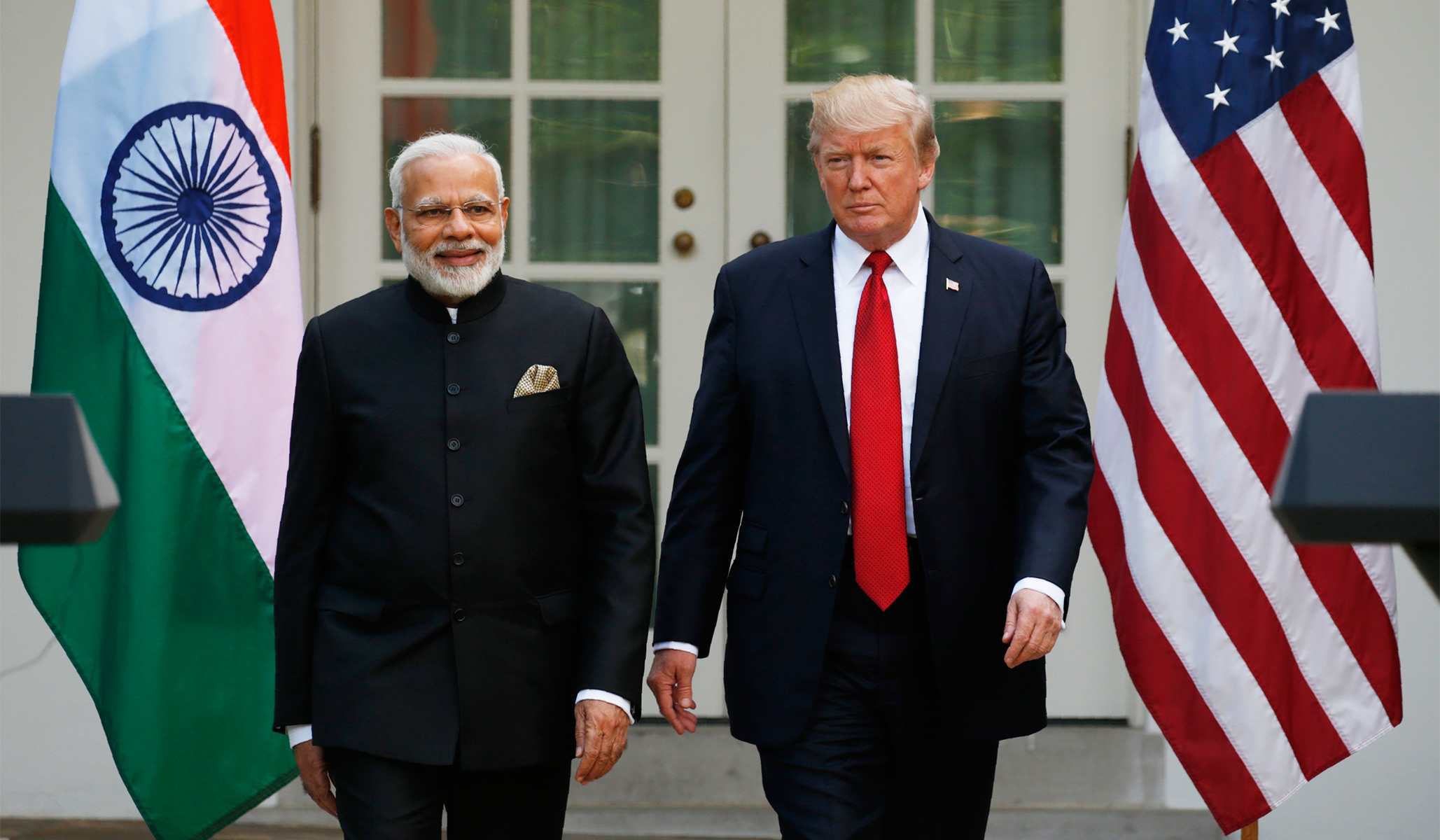


As the US presidential election approaches, one question on the minds of many is how a second Trump administration may impact India-US relations. With a focus on "America First" principles and a potential continuation of disruptive foreign policies, a renewed Trump presidency poses both opportunities and challenges for the strategic partnership between India and the US. Possible impacts on trade, immigration, and the Indian talent pool in the US are just a few areas to watch as the election results unfold.
India-US Relations: A Look at the Past and Potential Impacts of a Second Trump Administration
As the US presidential election approaches, the future of India-US relations has become a topic of significant discussion. With a focus on "America First" principles and a potential continuation of disruptive foreign policies, a renewed Trump presidency poses both opportunities and challenges for the strategic partnership between the two countries.
Background
India and the US have traditionally enjoyed strong diplomatic ties, with defense, trade, and shared democratic values as key pillars of their relationship. However, tensions emerged during the Trump administration, particularly over issues such as trade tariffs and immigration restrictions.
Potential Impacts of a Second Trump Administration
1. Trade: A second Trump administration could result in further trade disputes between India and the US. Trump has repeatedly criticized India's trade surplus with the US and has threatened to impose additional tariffs. This could potentially harm Indian exports and impact economic growth.
2. Immigration: Trump's immigration policies, including travel restrictions and reduced H-1B visas, have already affected the Indian talent pool in the US. A second Trump administration could further tighten immigration policies, limiting opportunities for highly skilled Indian workers.
3. Indo-Pacific Strategy: Trump's Indo-Pacific strategy has emphasized countering China's growing influence in the region. This could align with India's desire for greater security cooperation in the Indian Ocean. However, potential trade conflicts with China could have negative implications for India's economy.
4. Defense Cooperation: Trump has prioritized defense cooperation with India, particularly in the areas of arms sales and joint military exercises. A second Trump administration could further strengthen defense ties, enhancing India's capabilities against potential threats.
5. Climate Change: Trump's administration has withdrawn the US from the Paris Agreement on climate change. This could potentially create a rift between India and the US on this critical global issue, as India remains committed to the agreement.
Top 5 FAQs
1. What were the major tensions between India and the US during the Trump administration? Tariffs, immigration restrictions, and Trump's withdrawal from the Paris Agreement were key points of contention.
2. How could a second Trump administration impact trade between India and the US? Additional tariffs and trade disputes are possible, hindering Indian exports and economic growth.
3. What could be the effects of a second Trump administration on Indian immigrants in the US? Further restrictions on H-1B visas and travel limitations could reduce opportunities for Indian professionals.
4. How might a second Trump administration affect India's defense cooperation with the US? Increased arms sales and joint military exercises are likely, strengthening India's defense capabilities.
5. What are the potential implications of a Trump presidency on climate change cooperation between India and the US? Trump's withdrawal from the Paris Agreement could lead to differences between the two countries on this global issue.
Conclusion
The future of India-US relations under a second Trump administration remains uncertain. While there are potential opportunities for cooperation, there are also significant challenges that need to be carefully navigated. The outcome of the election will have a profound impact on the strategic partnership between the two countries, and it is crucial for both India and the US to work together to address common interests while mitigating potential frictions.

In a tightly contested race for the Rajya Sabha seats in Jammu & Kashmir, the ruling NC alliance emerged victorious, securing three out of the four seats. The BJP, which held only 28 seats in the Assembly, had hoped for a win through cross-voting or support from smaller groups. However, the NC's dominant position in the 88-member Assembly reaffirmed voter trust in their post-Article 370 political stability. PDP President Mehbooba Mufti also congratulated the NC candidates and expressed hope that they will strongly represent the people of Jammu & Kashmir in Parliament.

Mayor Derek Slaughter has vetoed a recent city ordinance that limits the terms of elected officials, citing concerns about retroactivity and lack of language addressing current officials. This veto comes after the ordinance was adopted in a 6-0 vote by City Council, with the mayor absent. If legally challenged, the defense of this ordinance could result in unnecessary costs for taxpayers. The mayor's decision has sparked a response from council members, with attempts to reach them for comment.

Prime Minister Narendra Modi addressed his first election rally in Bihar and expressed confidence in winning the upcoming polls. He mocked the opposition INDIA bloc and praised the unity within NDA, highlighting leaders like Nitish Kumar, Chirag Paswan, Jitan Ram Manjhi, and Upendra Kushwaha. Modi also criticized the 'jungle raj' under RJD and Congress and highlighted Bihar's progress under Nitish Kumar's tenure. Despite the upcoming Chhath festival, the PM thanked the crowd for attending and described the recent GST rate revision as a 'festival of savings'.

The suspension of Praveen Kumar K P, a PDO serving in Sirwar taluk of Raichur district, for participating in an RSS rally has sparked controversy in Karnataka. BJP leaders have condemned the move and promised to fight it legally, claiming that the officer's right to participate in such events is protected by law. Meanwhile, the state's Rural Development Minister has written to the Chief Minister for a ban on RSS activities on government premises, further intensifying the issue.

In a heated verbal exchange, Maratha quota activist Manoj Jarange Patil accused NCP Minister Chhagan Bhujbal of attempting to create a rift between the OBC and Maratha communities for political gain. During a recent OBC rally in Beed, Bhujbal and Dhananjay Munde attacked Jarange, with Pankaja Munde, a BJP OBC leader, watching from the sidelines. Jarange also praised Chief Minister Devendra Fadnavis and Minister Pankaja Munde for staying away from the rally and emphasized the unity of the OBC community. Bhujbal, on the other hand, warned Jarange against challenging the community's rights and vowed to stand up against any attempts to divide them.

On the auspicious occasion of Bhai Dooj, Madhya Pradesh Chief Minister Mohan Yadav transferred a total of 44,900 crore directly into the bank accounts of 1.27 crore women beneficiaries under the Ladli Bahna Yojana. This initiative aims to support and empower women in the state, with each eligible woman set to receive 1,500 per month from November onwards. During the special program at the Chief Minister's residence, Yadav extended his wishes for a happy Bhai Dooj, emphasizing the importance of the brother-sister relationship and the government's commitment towards ensuring the safety and well-being of Ladli Bahnas in the state.

Union Home Minister Amit Shah celebrated the Gujarati New Year and his 62nd birthday in his hometown of Ahmedabad, surrounded by senior political leaders, party members, and well-wishers. Shah's rise in public life through the RSS and his partnership with Prime Minister Narendra Modi have shaped Gujarat's and India's political narrative. His sharp organisational mind, efficient approach, and booth-level political management have been key in building the "Gujarat model" that gave the BJP an enduring edge. Despite transitioning to national politics, Shah's political heart still beats in Ahmedabad, as evident in his New Year celebrations and plans to meet the newly appointed ministers of the Gujarat cabinet.

In a recent incident at the Vasai Fort in Maharashtra, a man dressed as Chhatrapati Shivaji Maharaj got into a heated argument with a security guard over language. The man, who was recording a video, berated the guard for not speaking Marathi and disrespecting the legacy of Shivaji Maharaj. Social media users were divided in their opinions, with some criticizing the man's behavior while others felt the guard needed to be taught a lesson.

In a significant moment for gender equality, President Droupadi Murmu became the first woman to visit the Lord Ayyappa Temple in Sabarimala. Accompanied by her team, she performed Darshan and Puja at the shrine, praying for the well-being and prosperity of her fellow citizens. Her visit symbolized the Supreme Court's decision to lift the ban on menstruating women entering the temple, reminding us that devotion knows no gender barriers.

With early voting just days away, the three major candidates vying to become New York City's next mayor are gearing up for the final debate in what could be their last chance to sway voters. The debate, hosted by Spectrum NY1, The City, and WNYC/Gothamist, will cover issues such as affordability, crime, and the role of former President Donald Trump in the city's politics. With the stakes high and the clock ticking, Democrats Zohran Mamdani and Andrew Cuomo and Republican Curtis Sliwa will need to make a strong case for themselves to secure the future of New York City.